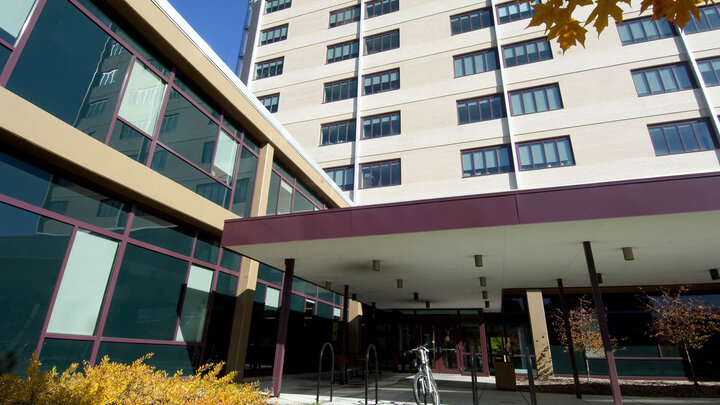CRAWL scientist Daniel Uden recently received the 2025 Faculty Inspiration Award in the School of Natural Resources. The student-selected award came on the heels of his receiving the 2024 Junior Faculty for Excellence in Research award from Nebraska’s Agricultural Research Division.
While the junior faculty award focused on his research in managing agricultural land and ecosystems to keep them resilient, the inspiration award focused on ways he inspired students.
“I was very honored to receive that,” Uden said about the latest award. “Especially knowing it was a student-nominated award, it was one of the most meaningful awards I could get.”
Catherine Chan, a doctoral student in remote sensing, read comments of Uden’s nominators at the spring banquet of the School of Natural Resources and announced him as the award winner.
“Dan consistently goes above and beyond for his students, whether he’s troubleshooting code, offering hands-on support in the field, stepping in to advise three doctoral students after an unexpected faculty departure or simply making sure his students feel seen and supported,” Chan said. “He naturally brings people together, cultivates a strong sense of connection and teamwork, and brings steadiness to high-pressure situations while still managing to stay genuinely enthusiastic. When you’re deep in research with no end in sight, that kind of energy matters more than you’d think.”
Uden advises or coadvises nine graduate students and serves on committees of other graduate students in the School of Natural Resources and Department of Agronomy and Horticulture. He said he wants to inspire students in his roles as advisor and mentor but also wants that inspiration to be intrinsic.
“What I hope happens is that they get a sense of the importance of what they're doing, that the work they're doing matters, and that they are the one that is going to advance science in that area,” he said. “It's not their advisor. It's not other professors. That is their responsibility. But it's an exciting thing. They don't know yet the things that they'll discover.”
As a resilience spatial scientist and assistant professor, Uden trains students in using technologies like GPS units and satellite data. He also works with students and other researchers to create tools people can use to manage their land and solve big problems like trees encroaching on grasslands. In Nebraska and other Great Plains states, the spread of redcedars poses many problems such as in continuing to provide forage for livestock and habitat for wildlife.
An overarching challenge he has been working to address is to maximize production of food and other basic resources while keeping the landscapes that produce them resilient. His research typically involves how location and spatial area play into that.
Tools he helped create recently include an adaptation of an ecological tool, the Resist-Accept-Direct Framework, to manage grasslands and a tool that uses the Rangeland Analysis Platform to scan and track the spread of invasive trees, shrubs and grasses on land. Creating such tools to help solve problems motivates him in his work, he said.
“It's not always easy, but to contribute to solving these broader challenges that we face in agriculture and natural resources and to know that my contributions there matter is just a constant source of motivation to me,” he said.
He works with others at Nebraska research sites such as Barta Brothers Ranch near Rose and Gudmundsen Sandhills Laboratory near Whitman to test land management strategies and find solutions, supporting students on related projects. He and the university make an investment in students, but he said he thought it was one of the best ones they could make. Seeing that students are inspired in their work is important, he said, because the challenges they face are important also.
“That’s ultimately what the dream is, that students will be inspired and self-motivated to pursue the answers to those questions and solutions to these challenges through their work,” he said. “And that they'll make new discoveries along the way, things that I could have never imagined and things that are beyond the work of the grant, and that they'll develop as researchers and continue to be motivated beyond their days in grad school or any individual project.”




